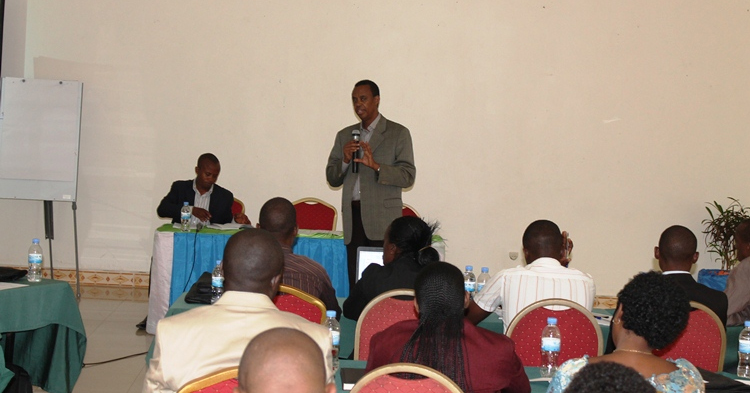On 11-12 January 2013, a seminar took place at Hotel La Palisse, Nyandungu. The seminar was meant to present the people chosen by political organisations to train their members in the local organs of the leadership of each political organisation and to see together how they will prepare seminars intended for trainees. Participants received teaching materials to support them in this activity.
In launching this seminar, the Executive Secretary of the National Consultative Forum of Political Organisations, Mr. KAYIGEMA Anicet, informed participants that the Forum prepared this programme for the leaders and members of political organisations of local organs, with intermediate knowledge/education and mainly in charge of communication within their respective political organisations at local level, in accordance with everybody’s duties.
He also informed them that this was a long-term programme, to be spread over five years, prepared by the Forum but to be implemented in collaboration between political organisations and the Forum under UNDP Funding.
In order for this programme to be implemented, political organisations were advised to designate graduates from the Youth Political Leadership Academy/YPLA because they are scientifically equipped to conduct seminars for the leadership of their political organisations at local level. This activity will give them the opportunity to improve their experience in preparing and conducting seminars focused on political themes.
Showing different parts of the programme, Mr. JIJUKA Zephyrin, Programme Coordinator at the Forum, informed future trainers that the teaching materials they were going to receive consisted of the curriculum with two main parts, namely:
Part One consisting of the general structure of the Curriculum containing the justification of the training, targeted trainees and their level of education, objectives of the Curriculum, methodology and approach, modalities for the selection of trainees, medium of instruction during the training, training batches, duration of the training programme, duties for each organ concerned with the training and assessment and follow-up approach.
Part Two of this Curriculum indicating the Modules as well as the following themes to be covered: Political organisations, their duties and functioning in democracy, the role of political organizations in the country’s governance and democracy. Last but not least, there is a module on political competition, elections, laws and guidelines governing the campaign period.
He continued his intervention showing that the teaching materials will be a tool to be used by political organizations in preparing capacity building training activities and in sensitising the members of these political organisations with a view to urging them to play a significant role in good governance and development.
After being briefed on the main points to be focused on in the preparation of modules and lessons, participants were grouped into teams, and they started practicing how to conduct a seminar. In this activity, each team showed expertise either in preparation or in facilitation/teaching.
In concluding the seminar, the Executive Secretary of the Forum informed the trainers that the training will focus on participatory approach whereby the trainee is deeply involved in learning activities.
He indicated that these teaching materials aim at promoting and fostering values having to characterize a politician and any genuine leader. He recommended learning based on concrete examples and real-life situations.
He continued his intervention by reminding future trainers to make sure that the training is centred on learners’ ideas and actions, not on the trainers themselves.
He assured them that using this approach enabling the trainee to practice activities in tandem with their duties will help everybody build confidence in themselves and understand that they should translate their words into concrete actions.
He informed them that the general assessment on the conduct of the seminar will take place after six months. However, as indicated at the beginning, this programme will cover five years. Also, each batch will be assessed in order to make improvements to feed into following batches.

